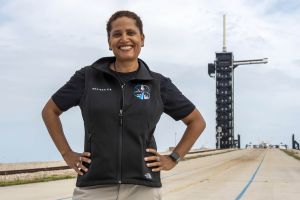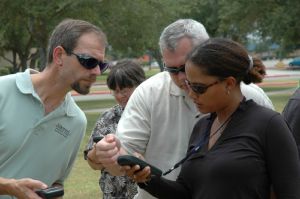

Sian Proctor, a geoscience professor for more than 20 years at South Mountain Community College in Phoenix, Arizona, and current Mentor-Connect mentee, has been selected for Inspiration4. The three-day mission aboard a SpaceX rocket this autumn will be the first by an all-civilian crew of four.
Proctor’s extraordinary resume of professional development and scientific explorations includes participating in Integrated Geospatial Education and Technology Training (iGETT), an Advanced Technological Education project funded in 2007 and 2012 by the National Science Foundation that was led by Osa Brand. Brand is currently a Mentor-Connect mentor and senior member of Mentor-Connect’s leadership team. Mentor-Connect is an ATE project led by Florence-Darlington Technical College in partnership with the American Association of Community Colleges.
Brand remembers Proctor from iGETT as “extremely capable, [She] showed very strong leadership qualities and was the kind of person who would brighten up a room as soon as she walked in.”
Ann Johnson, who was a co-principal investigator of iGETT and is now mentoring South Mountain Community College’s Mentor-Connect team, said Proctor was vying to become a NASA astronaut around the time that she was participating in iGETT. Proctor made it to NASA’s finalist round in 2009.
“It’s wonderful that it’s a lifelong dream come true,” of Proctor’s selection by Inspiration4.
iGETT Project Fosters Curriculum Development & Leadership
iGETT was designed to have community college faculty interact in a sequence of professional development activities over two years. Each of the four cohorts (each cohort had 12 to 17 people) met in person for an eight-day summer institute the first summer and a five-day institute the second summer. It also convened participants periodically throughout the academic year for webinars with remote sensing scientists and to share classroom resources. Both grants (0703185 and 1203069) were awarded to the National Council for Geographic Education; NASA was a partner on both projects. The first project focused on integrating remote sensing modules into geospatial courses. The second project focused on workforce competencies for remote sensing technicians.
iGETT activities fostered a professional community among the participants. About a third of them continue to communicate regularly via the iGETT Facebook Group where they share curricula and discuss pedagogical issues.
About 30% of the 72 participants leveraged their iGETT experiences to lead other grant-funded initiatives including ATE projects. “It really was one of those things that really gave the people enough time and enough knowledge and enough confidence and leadership skills to go and do things continually,” Johnson said.
Mentor-Connect is Proctor’s first formal reengagement with the ATE community since 2010 when the second iGETT cohort, which she was in, wrapped up.
In the intervening 11 years Proctor has been extremely busy adding explorer, analog astronaut, and science communicator to her geoscientist curriculum vitae. (Because of her training for the space mission, Proctor was not available for an interview for this article.) She has a B.S. in environmental science, M.S. in geology, and a Ph.D. in science education. She has a pilot license and is a scuba diver.
On her personal website, Proctor states, “I am a continuing Solar System Ambassador and serve on the National Science Teaching Association’s Aerospace Advisory Board, the JustSpace Alliance board, and the SEDS USA advisory board. In 2019, I was the science communication outreach officer on the JOIDES Resolution expedition 383 and spent 2 months at sea investigating the dynamics of the Antarctic Circumpolar Current. I also participated in the 2-week faculty development seminar Exploring Urban Sustainability in India. I was a 2017 National Oceanic and Atmospheric Administration (NOAA) Teacher at Sea, a 2016 Astronomy in Chile Educator Ambassador (ACEAP), and a 2014 PolarTREC Teacher investigating climate change in Barrow, Alaska.”
Inspiration4 Selects Proctor
Proctor was selected for Inspiration4 through a contest by Shift4 Payments, a software company owned by Jared Issacman. Issacman is the entrepreneur, pilot, and philanthropist who purchased the time on SpaceX to give “nonbillionaires a chance to hitch a ride” and to raise money for St. Jude Children’s Research Hospital.
Proctor used the Shift4Shop e-commerce platform for Doctor Proctor’s Space2Inspire, a website where she sells her space-related artwork and promotes space-related poetry. “My goal is to help create a Just, Equitable, Diverse and Inclusive space (J.E.D.I. space) for all of humanity,” she states on the website.
In her video pitch for the Prosperity seat contest, Proctor said, “What I am most proud of is the fact that I have been a teacher at a community college for the past 20 years. And I have been able to inspire hundreds of thousands of students through my education and outreach. My entrepreneurial spirit lies in the fact that I combine space artwork with poetry.”
The poem she recites during the two-minute video includes this stanza: “It’s not about you. It’s not about me. It’s about space to inspire for all of humanity.”
Proctor told the editor of Community College Daily in April that the centrifuge and simulation training and camping exercises that the Inspiration4 team was then doing to prepare for the mission were instances of “exciting” lifelong learning. “That’s something that I always try to instill in my students. Your education doesn’t stop when you leave my classroom,” she is quoted in the April 8 article.
A 2012 Profiles in Strength interview for the Strengths and Wellbeing initiative at South Mountain Community College, Proctor describes herself as “very opportunistic,” and explains, “I feel constantly propelled to find unique opportunities and pursue them. If you’re always visualizing your future, then you find ways to make it happen.”
And that is what Proctor has done to make her dream of traveling in space happen.

 Subscribe
Subscribe


 See More ATE Impacts
See More ATE Impacts

Comments
There are no comments yet for this entry. Please Log In to post one.